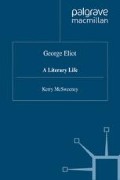Abstract
Marian Evans was born and lived the first thirty years of her life in the northeastern part of Warwickshire between Nuneaton and Coventry. The second half of her life was centred in London and considerable amounts of time were spent on the continent. But she always retained a deep attachment to the Midlands, and, imaginatively speaking, may be said to have never left. Six of her eight works of fiction were set there, and the display of provincial life and scenes is as fresh and copious in Middlemarch, her penultimate novel, as it is in Scenes of Clerical Life, her fictional début. A panoramic view of the region is found in the ‘Introduction’ to Felix Holt, which describes what could be seen in the early 1830s from the outside of a stage coach travelling through ‘that central plain, watered at one extremity by the Avon, at the other by the Trent’:
In these midland districts the traveller passed rapidly from one phase of English life to another: after looking down on a village dingy with coal-dust, noisy with the shaking of looms, he might skirt a parish all of fields, high hedges, and deep-rutted lanes; after the coach had rattled over the pavement of a manufacturing town, the scene of riots and trades-union meetings, it would take him in another ten minutes into a rural region, where the neighbourhood of the town was felt only in the advantages of a near market for corn, cheese, and hay … The busy scenes of the shuttle and the wheel, of the roaring furnace, of the shaft and the pulley, seemed to make but crowded nests in the midst of the large-spaced, slow-moving life of homesteads and faraway cottages and oak-sheltered parks.
George Eliot was born early enough in the last century to see an England which has almost completely passed away, and yet her education was modern. Her youthful impressions were cherished with affection and were the root of a sweet and healthy conservatism. In later life she did not cast herself loose, but applied herself with all her natural strength and with all her stores of the newest thought to display and interpret the Warwickshire of her childhood, its fields, its villages, their inhabitants and their beliefs. It was not a mere outside London literary study, as those who remember the Midlands of her day can testify, and yet she was sufficiently aloof to depict them. She owed to them the foundation of what she was, but they, through her, became vocal. She was exactly the right person, and came at exactly the right moment.
William Hale White (‘Mark Rutherford’)
Access this chapter
Tax calculation will be finalised at checkout
Purchases are for personal use only
Preview
Unable to display preview. Download preview PDF.
Notes
Howard R. Murphy, ‘The Ethical Revolt against Christian Orthodoxy in Early Victorian England’, American Historical Review, 60 (1955), 801, 816.
Waldo Hilary Dunn, James Anthony Froude: A Biography (Oxford: Clarendon, 1961), i, 236.
William J. Brazill, The Young Hegelians (New Haven: Yale UP, 1970), 105.
Raymond Chapman and Eleanora Gottlieb, ‘A Russian View of George Eliot’, Nineteenth-Century Fiction, 33 (1978), 352.
Author information
Authors and Affiliations
Copyright information
© 1991 Kerry McSweeney
About this chapter
Cite this chapter
McSweeney, K. (1991). Warwickshire 1819–1849. In: George Eliot. Literary Lives. Palgrave Macmillan, London. https://doi.org/10.1057/9780230389656_1
Download citation
DOI: https://doi.org/10.1057/9780230389656_1
Publisher Name: Palgrave Macmillan, London
Print ISBN: 978-0-333-66550-3
Online ISBN: 978-0-230-38965-6
eBook Packages: Palgrave Literature & Performing Arts CollectionLiterature, Cultural and Media Studies (R0)

